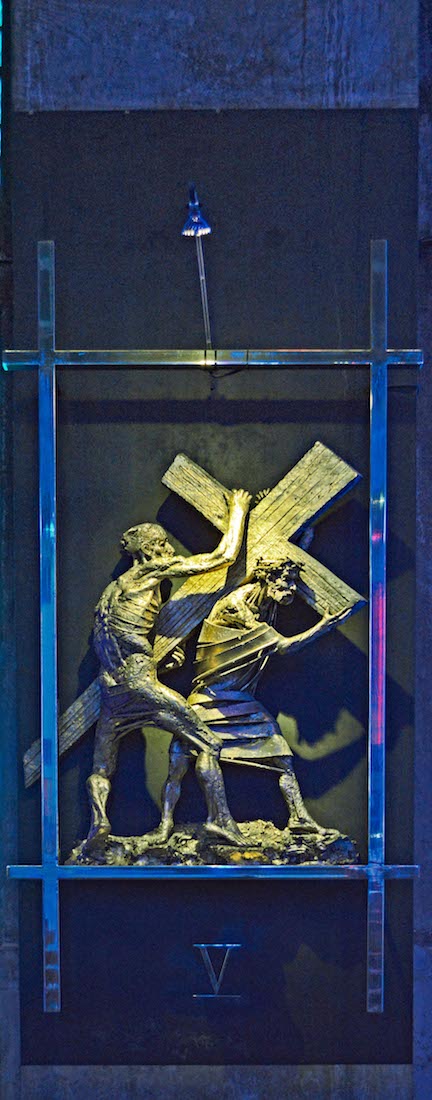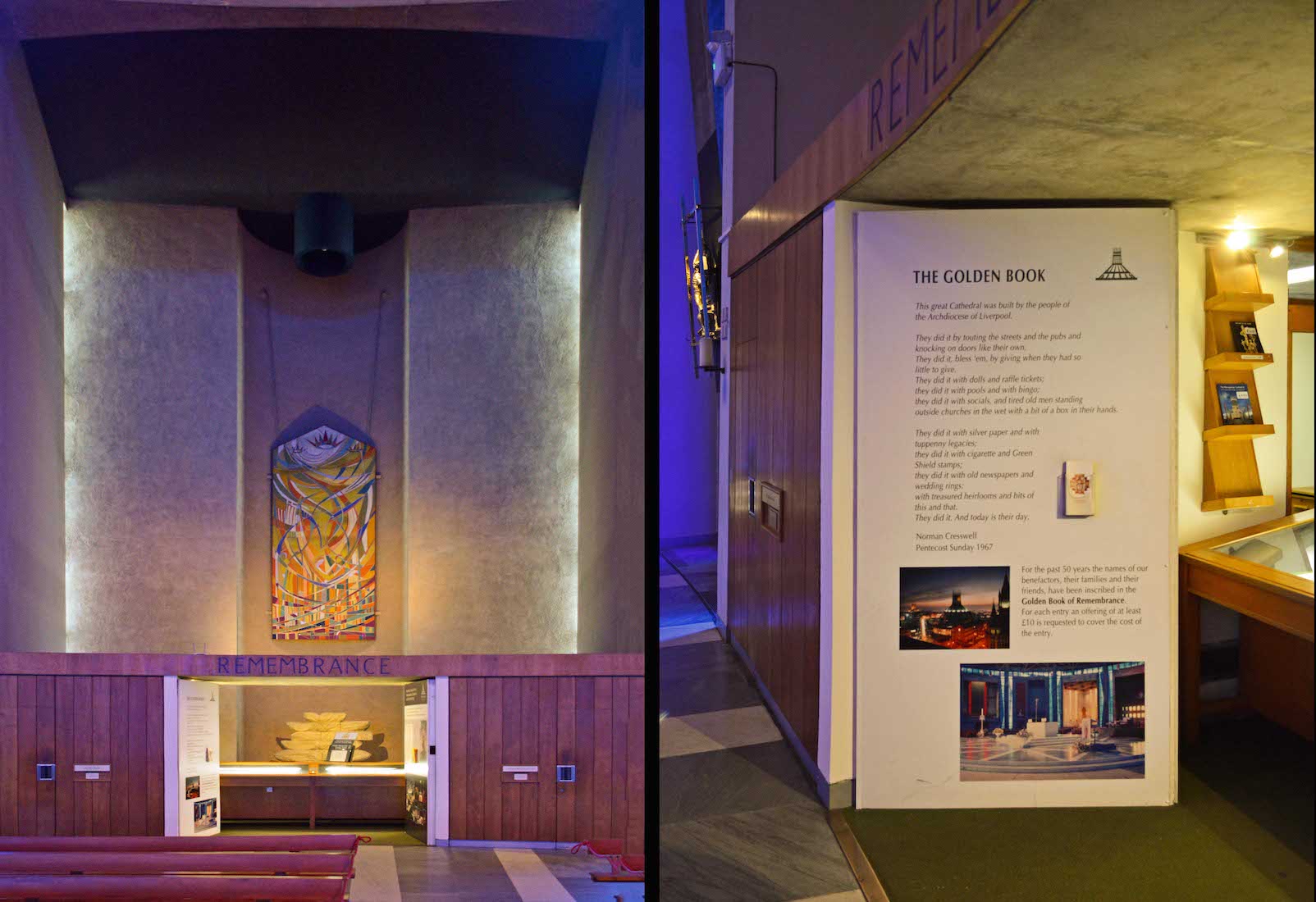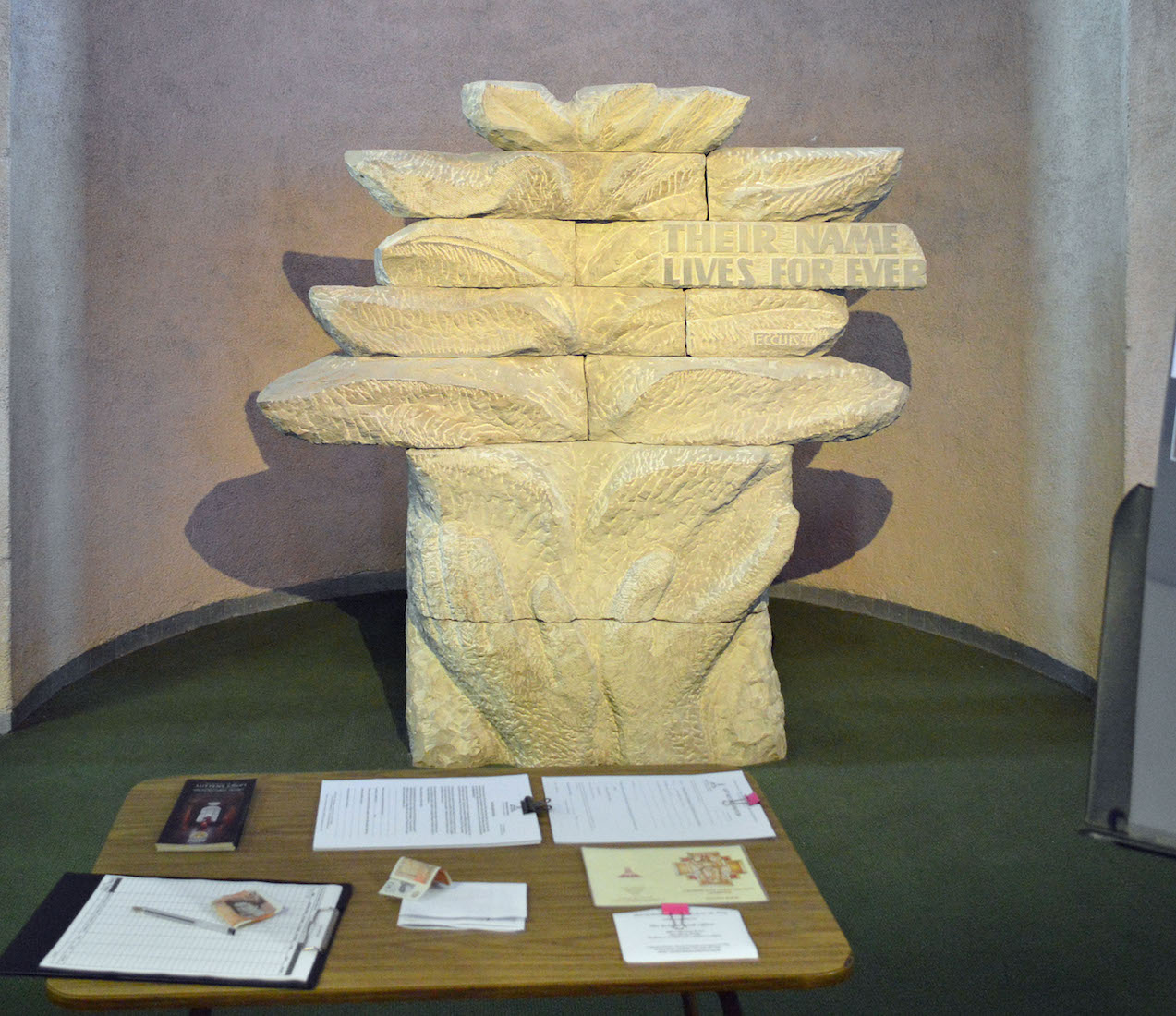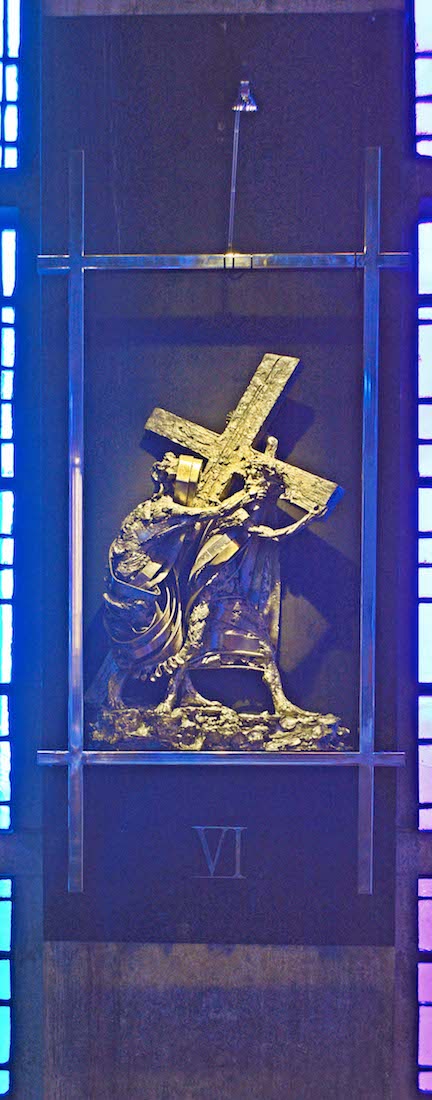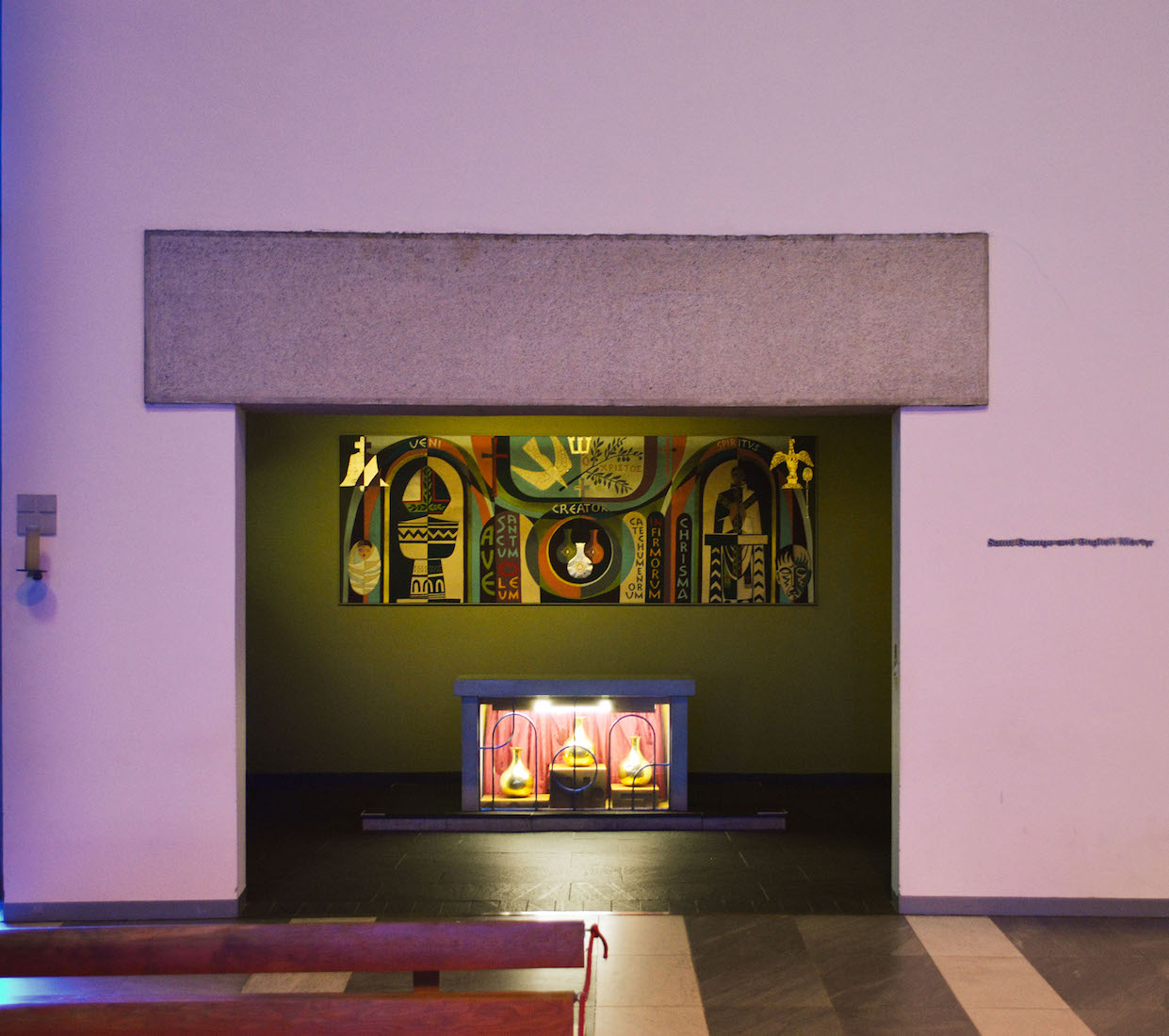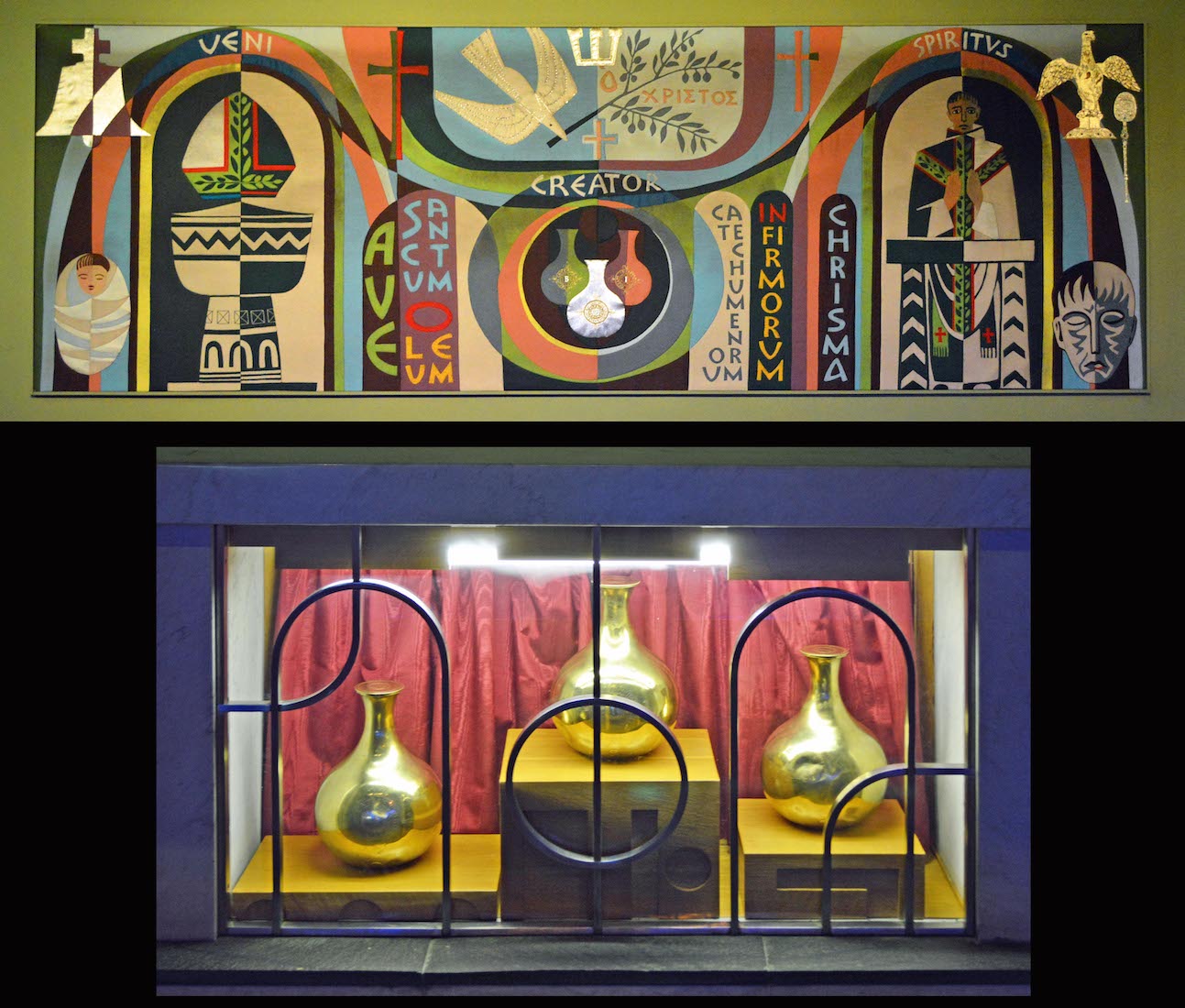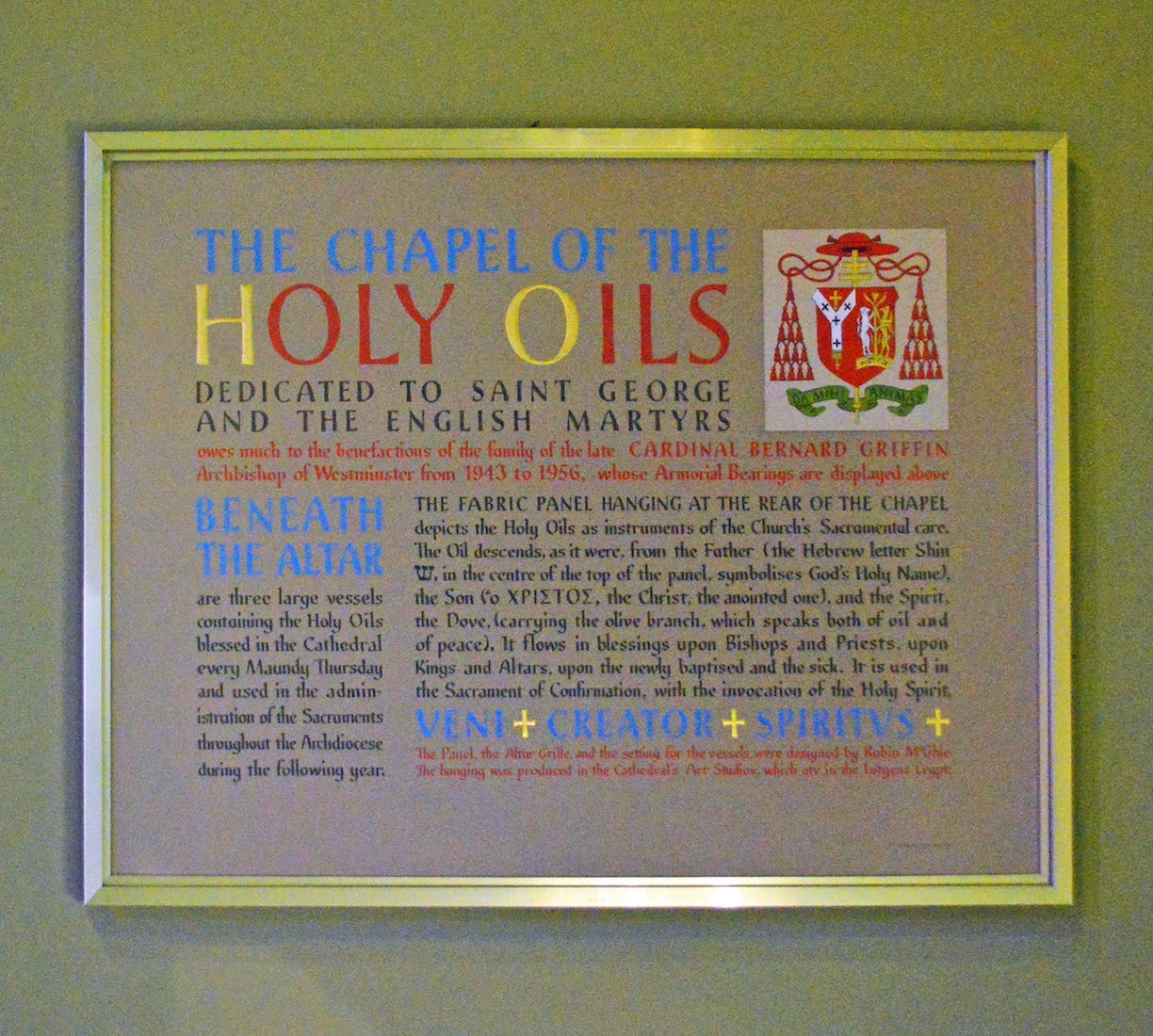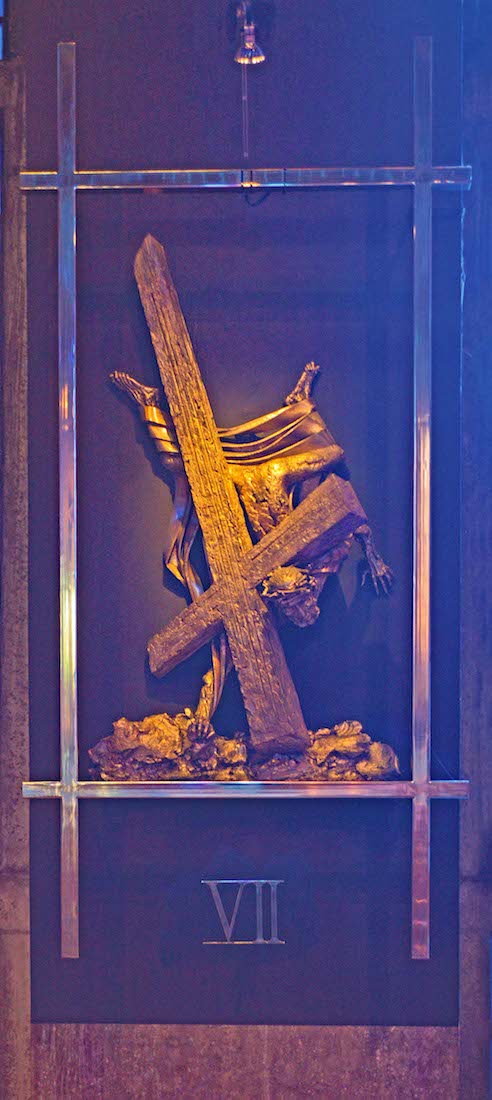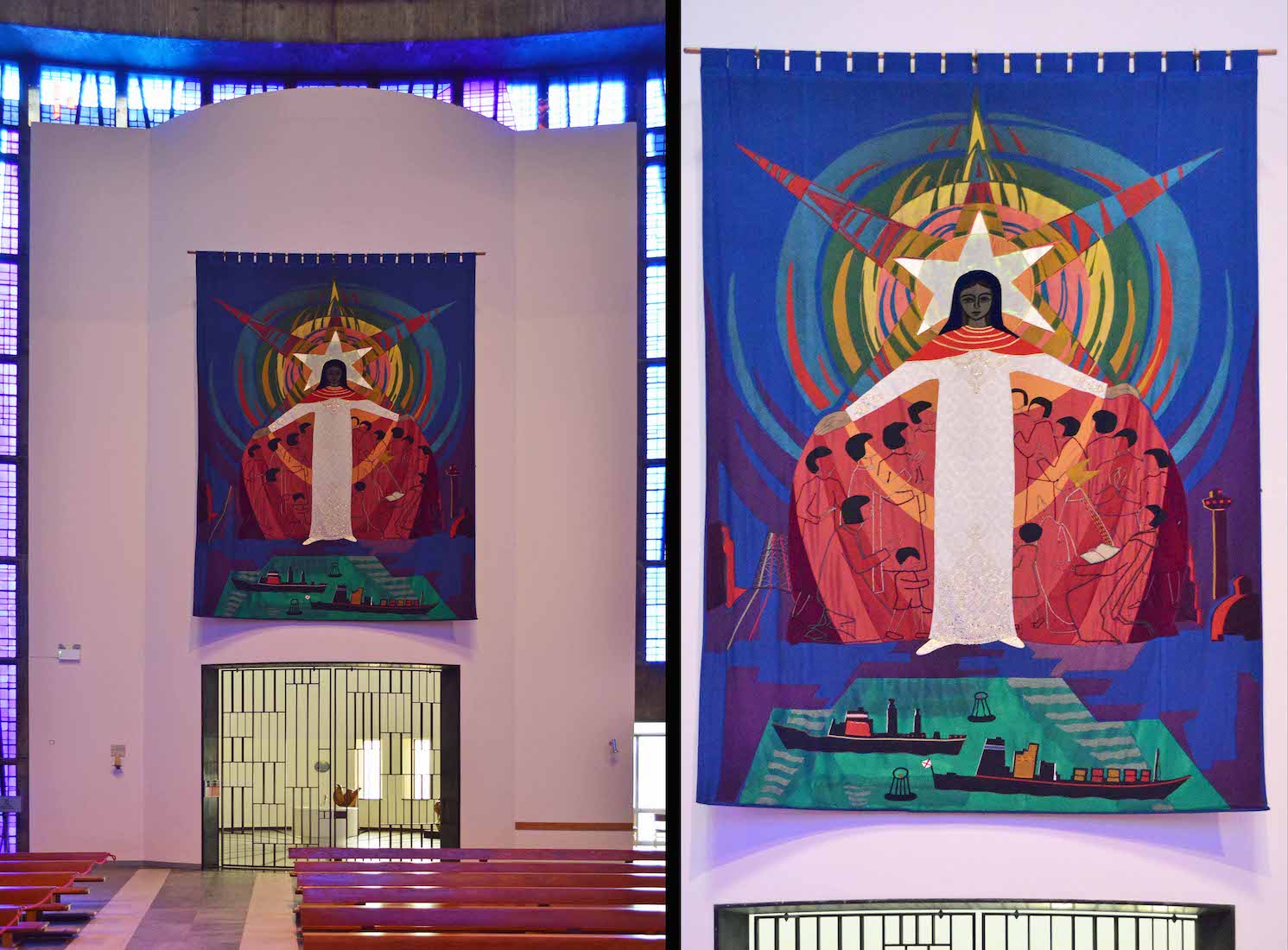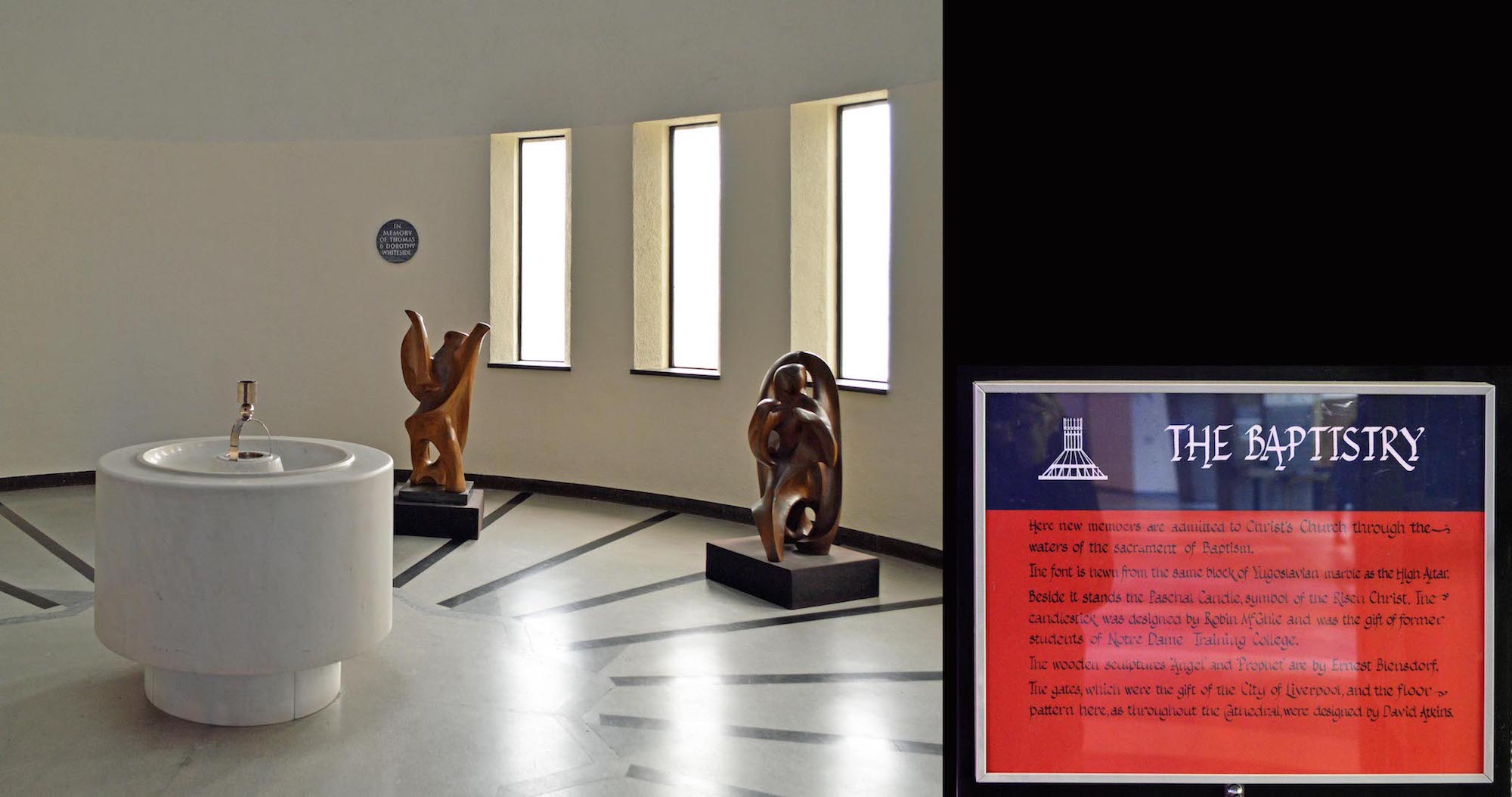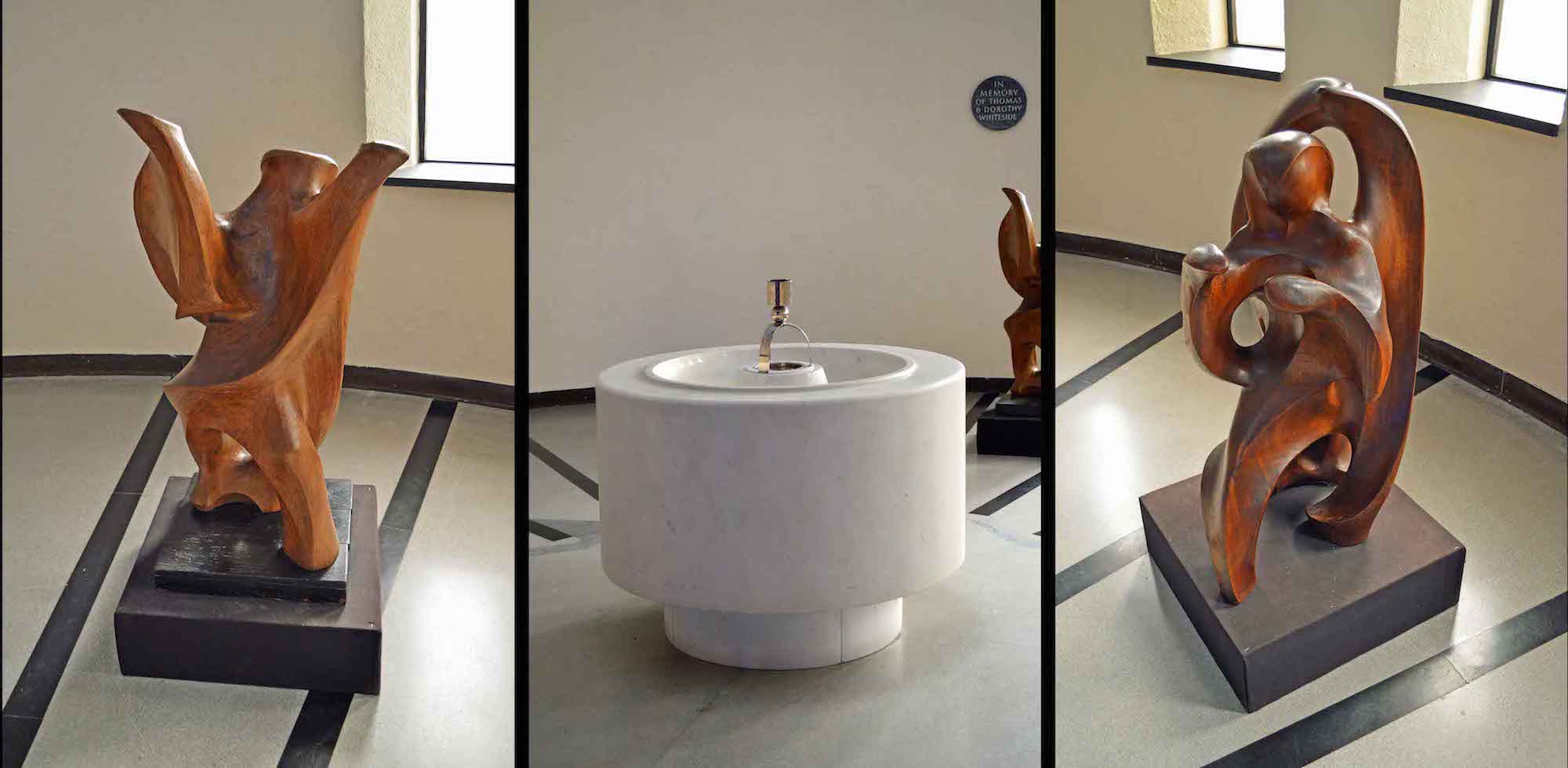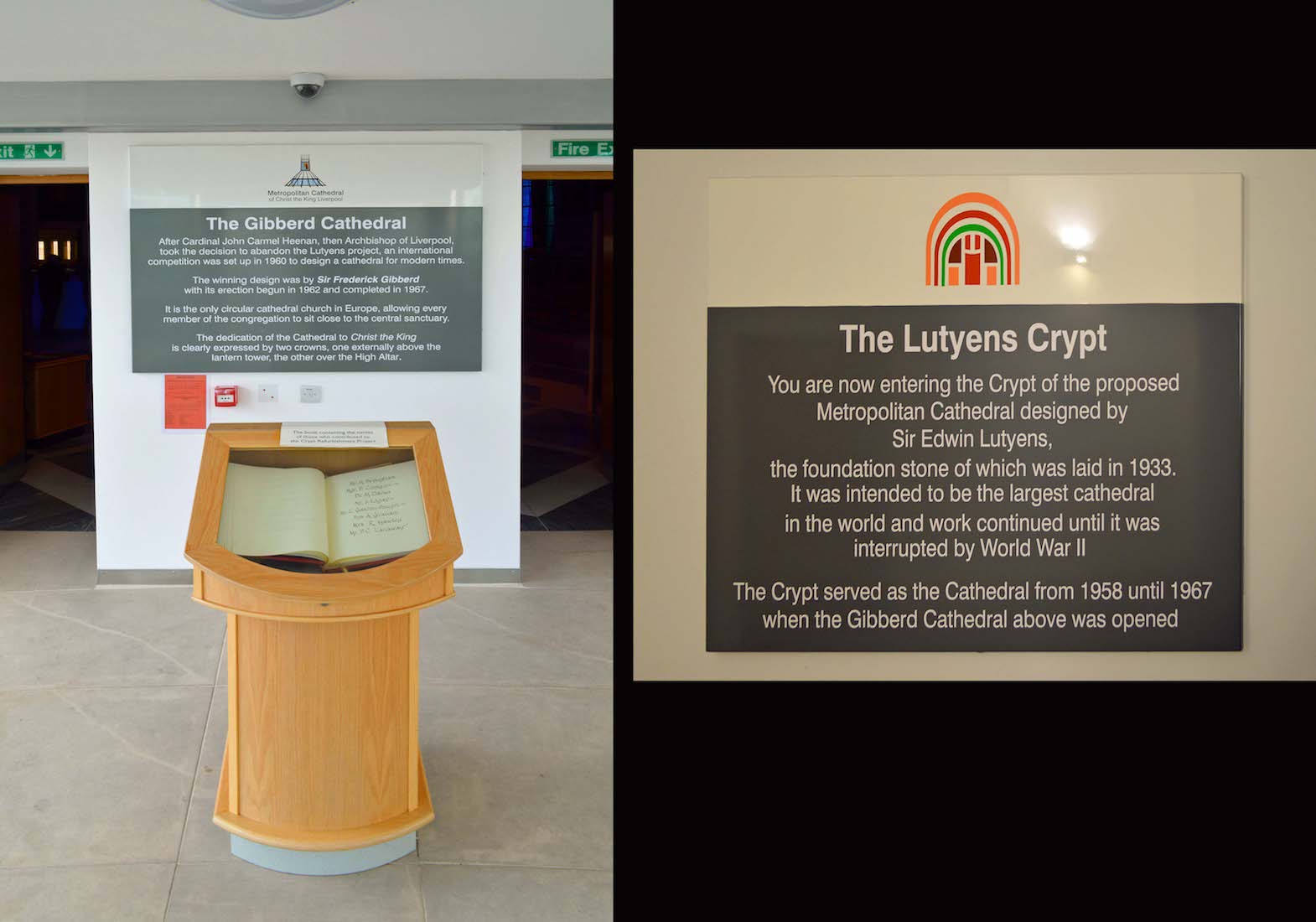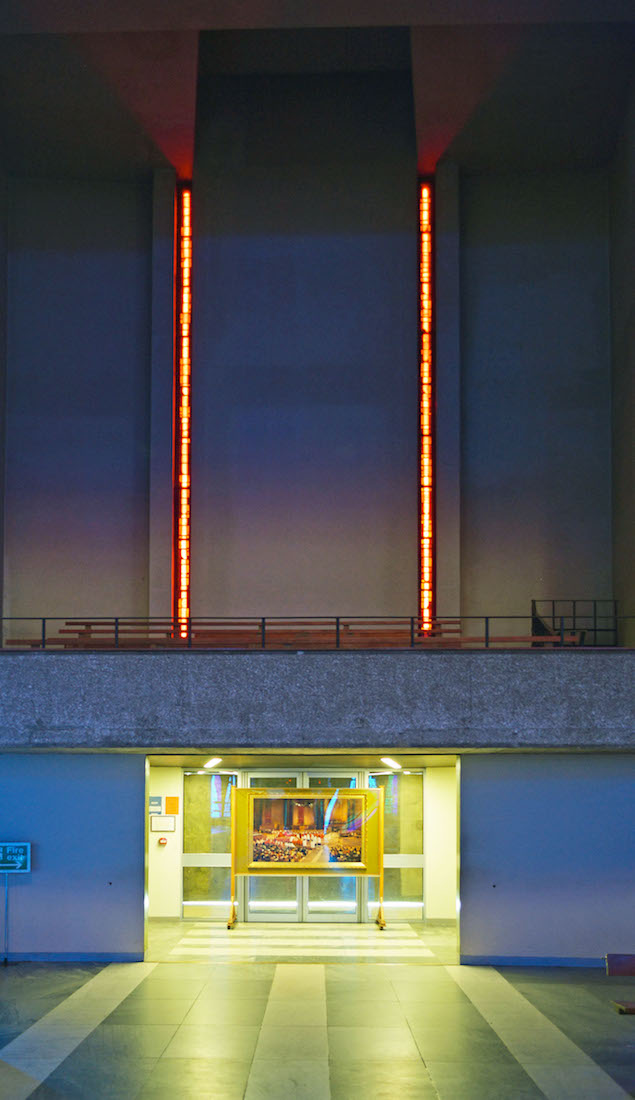
The eastern slot in the Cathedral appears to be an emergency exit with doors blockaded by a moveable screen. PLAN
62. HISTORIC OPENING PHOTOGRAPH
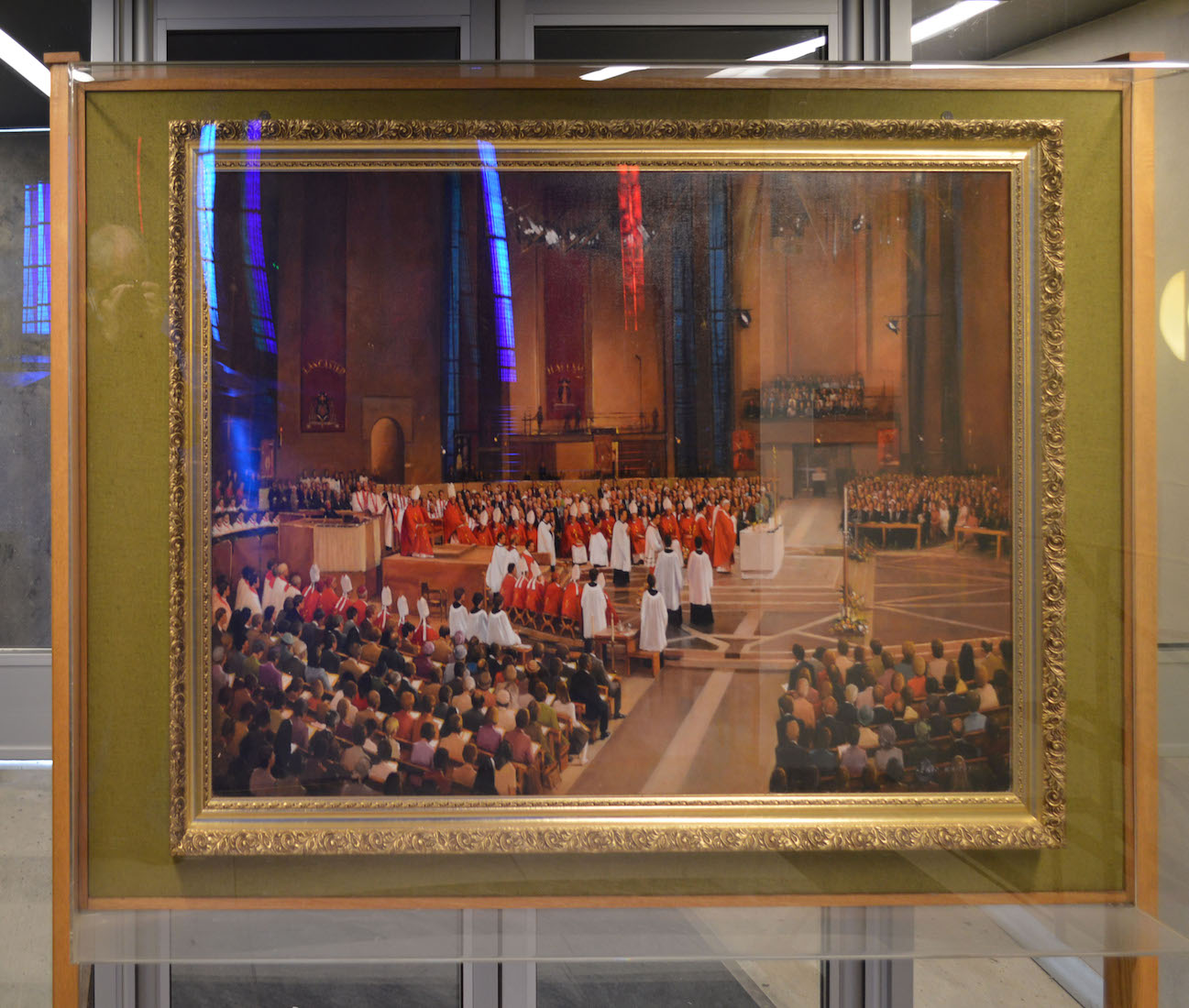
On the screen is an historic framed photograph of the opening of the Cathedral with the attendance of many dignitaries. We move to the next Station of the Cross.
63. STATION V
Matthew, Mark, and Luke all identify the man who helped Jesus carry the cross as Simon, a man from Cyrene (Matthew 27:32; Mark 15:21; Luke 23:26). Cyrene was an ancient city in Libya, Africa. Its location has led to many traditional depictions of Simon as an African black man, but we cannot be sure. Station V : Simon of Cyrene helps carry the cross.
64. CHAPEL OF REMEMBRANCE
This chapel contains the volumes of the Cathedral Golden Book – a book of remembrance for benefactors and their families, whose names are inscribed in it. Above the entrance to the chapel is an embroidered panel designed by Sister Anthony Wilson SND, and made by the Cathedral Art Studio. It was inspired by the poem ‘The Dream of Gerontius’ by Cardinal John Henry Newman, and depicts in semi-abstract style, souls of the redeemed ascending to the glory of heaven and their eternal reward.
65. REMEMBRANCE SCULPTURE
The stone sculpture carries the verse ‘Their names live forever’, which comes from the book of Sirach (Ecclesiasticus) 44:14. This is a verse often associated with war memorials.
66. STATION VI
According to Church tradition, Veronica was moved with sympathy when she saw Jesus carrying his cross to Golgotha and gave him her veil that he might wipe his forehead. Jesus accepted the offering, held it to his face, and then handed it back to her – the image of his face miraculously impressed upon it. This piece of cloth became known as the Veil of Veronica. Station VI : Veronica wipes the face of Jesus.
67. HOLY OILS CHAPEL
In this chapel are deposited the vessels containing the oils blessed in the Cathedral each Holy Thursday and distributed throughout the parishes of the Archdiocese.
68. HOLY OILS
The embroidery panel was designed by Robin McGhie (born 1921) and made in the Cathedral Art Studio. It depicts the various uses made of the oils in the sacraments and rites of the Church. There are three kinds: oil of catechumens, holy chrism, and oil of the sick. The first and third are pure olive oil; chrism has in the oil a mixture of balm or balsam. They are used in the public administration of baptism, confirmation, and anointing of the sick.
69. CHAPEL INFORMATION
The text here reads: The Chapel of the HOLY OILS, Dedicated to St George and the English Martyrs owes much to ... the family of the late Cardinal Bernard Griffin, Archbishop of Westminster from 1943 to 1956, ... . The Fabric Panel ... depicts the Holy Oils as instruments of the Church’s sacramental care. The Oil descends from the Father ... the Son ... and the Spirit ... . It flows in blessings upon Bishops and Priests, upon Kings and Altars, upon the newly baptised and the sick. It is used in the Sacrament of Confirmation with the invocation of the Holy Spirit ... . VENI + CREATOR + SPIRITUS ...
70. STATION VII
Station VII : Jesus falls for the second time. This is a very dramatic representation!
71. BAPTISTRY
The bronze gates of the Baptistry were designed by David Atkins and presented by the City of Liverpool. The wall hanging above the entry is ‘Our Lady of Liverpool’ designed by SIster Anthony Wilson and made by the Cathedral Art Studio. Mary, Star of the Sea, Protectress of the City of Liverpool, spreads her cloak around the people, amongst whom the Archbishop kneels in prayer. At Our Lady’s feet is the River Mersey and behind her the skyline of the City.
72. INSIDE THE BAPTISTRY
Inside the Baptistry stands a round font and two wooden sculptures. The information panel at right gives information about the rite of baptism and also about the baptistry itself. Baptism is regarded as the rite of entry into the Church and participation within the Christian community.
73. FONT AND SCULPTURES
The simple font, like the high altar, is made from white marble quarried near Skopje in Macedonia. It is round in shape, in keeping with the architecture of the Cathedral. The two wooden sculptures are entitled ‘Prophet’ and ‘Angel’. They are by Professor Ernst Blensdorf (1896 – 1976).
74. DOWN TO THE CRYPT
As mentioned earlier, photography is not allowed in the crypt. However it is worth paying the small fee to visit the crypt and the Cathedral treasury. Some idea of the crypt and treasury can be obtained from the cathedral posting found at:
https://www.liverpoolmetrocathedral.org.uk/the-lutyens-crypt-treasury/
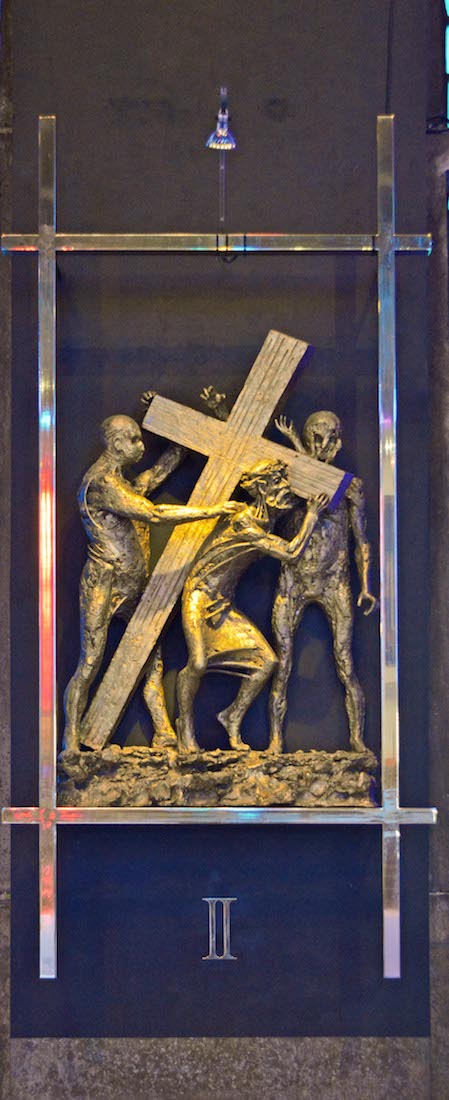
CONCLUSION
I hope you have enjoyed visiting the Liverpool Catholic Cathedral with me. I found it unusual and creative in its design – the first sight of the interior took my breath away!
I am happy to receive constructive comments or corrections concerning this website. The best websites are the ones which have no errors! I am grateful to my wife Margie who has proof-read these pages.
Liverpool Catholic Cathedral has an interesting website. The link for the Cathedral website is:
https://www.liverpoolmetrocathedral.org.uk/
While the photographs on this site are all mine, I take little credit for the accompanying text. My main sources have been Wikipedia and the excellent Authorised Cathedral Guide (book), and I gladly acknowledge these sources.
The photographs which appear on this site can also be found in higher resolution at:
https://www.flickr.com/photos/paulscottinfo/sets/
Paul Scott Site created 08 / 2018. Reconstructed 04 / 2019. Reformatted 05 / 2020.

